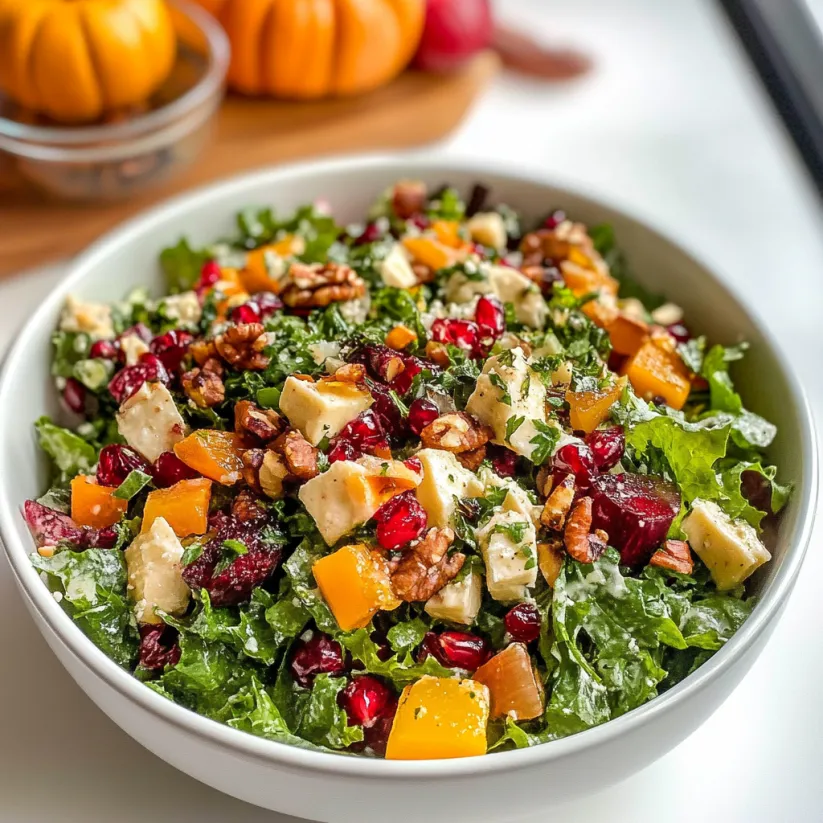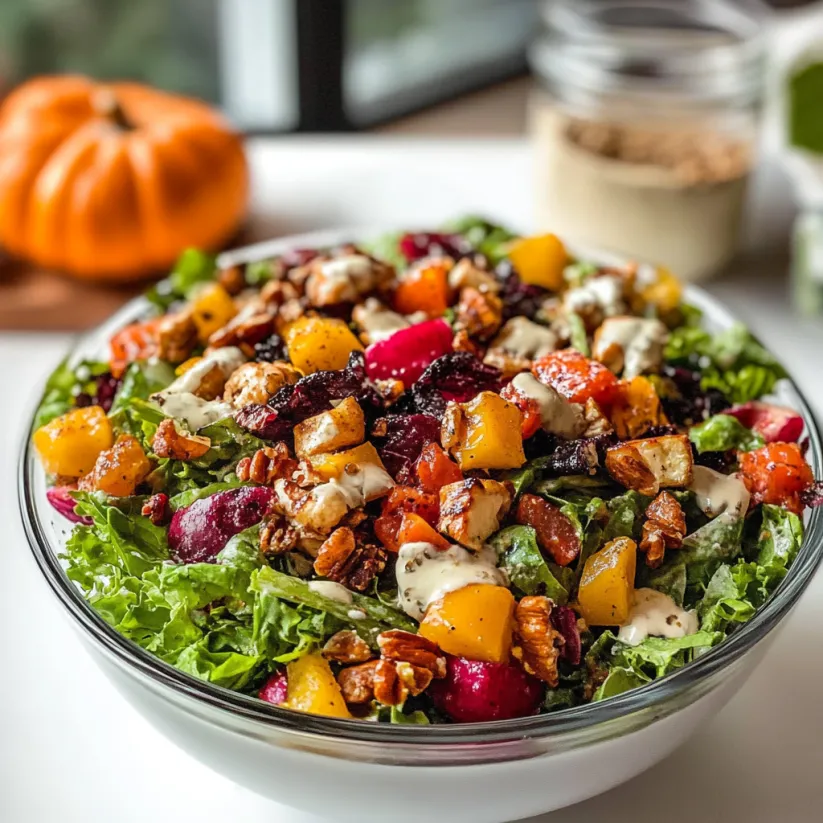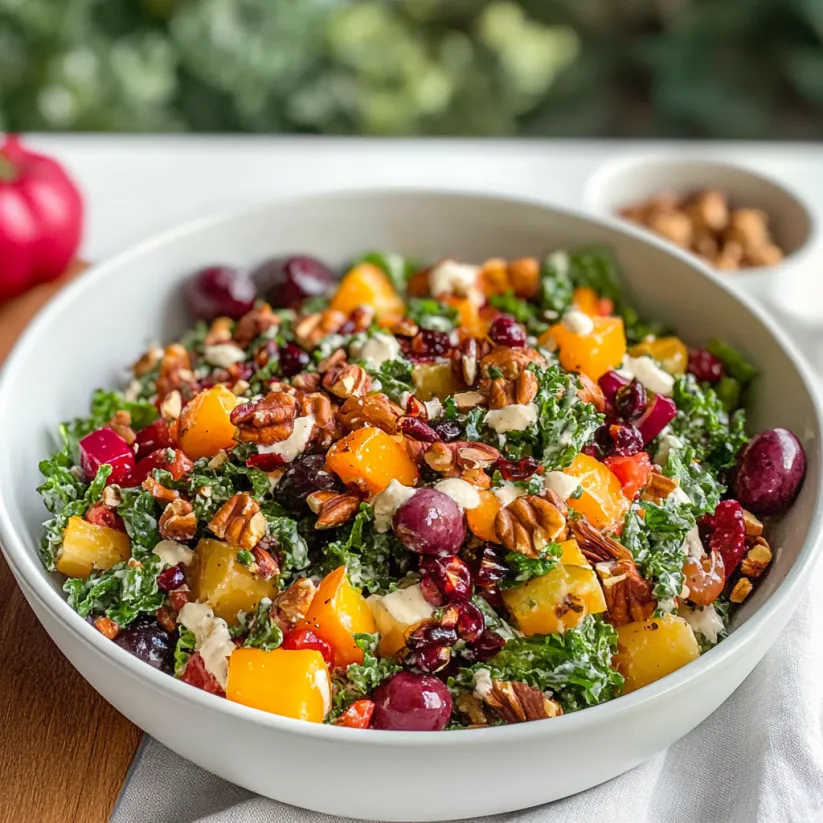 Save Pin
Save Pin
This vibrant fall harvest salad combines the best autumn flavors into one nutritious bowl. The roasted vegetables create a hearty base while the maple tahini dressing adds a creamy, slightly sweet finish that ties everything together perfectly.
I first created this recipe when looking for ways to use my farmers market haul during peak autumn harvest. What started as a simple side dish quickly became our family's go-to holiday table centerpiece that even the vegetable skeptics devour.
Ingredients
For the Salad
- Brussels sprouts: bring a nutty flavor when roasted and provide excellent texture contrast. Look for firm, bright green sprouts with tightly packed leaves
- Butternut or acorn squash: adds natural sweetness and heartiness. Choose squash that feels heavy for its size with unblemished skin
- Beets: contribute earthy flavor and vibrant color. Smaller beets tend to be more tender and sweet
- Olive oil: helps vegetables caramelize properly when roasting. A good quality extra virgin works best here
- Kale: provides a nutritious base that stands up well to the dressing without wilting. Dinosaur kale works particularly well
- Apple: brings crisp freshness and natural sweetness. Honeycrisp or Pink Lady varieties offer the perfect balance of sweet and tart
- Walnuts or pecans: add essential crunch and healthy fats. Toast them lightly for enhanced flavor
- Dried cranberries: contribute chewy texture and tart sweetness. Look for ones without added sugar if possible
- Pomegranate arils: provide juicy bursts of flavor and visual appeal. Buy whole pomegranates and seed them yourself for the freshest taste
For the Tahini Maple Dressing
- Tahini: creates the creamy base. Choose a good quality, well-stirred tahini without bitter aftertaste
- Maple syrup: adds natural sweetness that complements the fall flavors. Use real maple syrup not pancake syrup
- Apple cider vinegar: brings necessary acidity to balance the dressing. Raw unfiltered varieties offer more complexity
- Fresh lemon juice: brightens all the flavors. Always use freshly squeezed for best results
- Garlic: provides depth and subtle heat. Fresh cloves yield much better flavor than pre-minced
- Water: helps achieve the perfect consistency. Add gradually to control thickness
- Salt: enhances all the other flavors. A flaky sea salt works wonderfully here
Step by Step Instructions
- Prepare the vegetables:
- Preheat your oven to 425°F and prepare your baking sheets with parchment paper. The high temperature ensures good caramelization which develops deeper flavor in all the vegetables. Trim the brussels sprouts by cutting off the tough stem end then halve them lengthwise. For particularly large sprouts quarter them to ensure even cooking. The goal is to create pieces that will roast at roughly the same rate.
- Prepare the squash:
- Choose your preferred method based on your comfort level with cutting squash. The easiest approach is cutting the squash into large manageable chunks, roasting until tender then removing the skin and dicing after cooling slightly. This method requires less knife work with the hard raw squash. Alternatively you can halve the squash, remove seeds and roast face down until fork tender. The third option is peeling and dicing raw then roasting alongside the other vegetables. Each method works well just choose what fits your skill level.
- Prepare the beets:
- For the simplest approach peel and dice the beets into smaller pieces than the other vegetables since they take longer to cook. Roast them on the same tray as your other vegetables. If you prefer less color bleeding you can steam or boil beet chunks until fork tender then cool and dice. The roasting method concentrates flavor better but both approaches work well.
- Roast the vegetables:
- Arrange all prepared vegetables on baking sheets ensuring they have plenty of space and aren't overcrowded. Toss with just a teaspoon of olive oil and a pinch of salt and pepper. The light seasoning allows the natural flavors to shine. Roast for 30-40 minutes until the vegetables are tender and edges are caramelized. Stir halfway through for even browning.
- Prepare the kale:
- While vegetables roast, thoroughly wash and dry kale leaves. Remove the tough center stems by holding the stem in one hand and pulling the leaf away with the other. Chop the leaves finely this helps break down the fibrous texture and makes the kale more pleasant to eat raw. Place the chopped kale in a large serving bowl large enough to hold all ingredients.
- Make the dressing:
- Combine all dressing ingredients in a blender starting with just 4 tablespoons of water. Blend until completely smooth and creamy with no garlic chunks remaining. Add additional water one tablespoon at a time until you reach your desired consistency. The dressing should be pourable but still thick enough to coat the back of a spoon. Taste and adjust salt as needed.
- Assemble the salad:
- Once vegetables have cooled slightly add them to the bowl with the kale along with the diced apple, walnuts, dried cranberries, and pomegranate arils. The residual heat from the roasted vegetables will slightly soften the kale without wilting it completely. Pour the dressing over everything and toss thoroughly to ensure all components are evenly coated. Serve immediately while still slightly warm for the best flavor experience.
 Save Pin
Save Pin
The tahini maple dressing is truly the star of this recipe. I discovered this combination years ago when experimenting with plant-based dressings and it has become my signature sauce for everything from salads to grain bowls. Something magical happens when the nutty tahini meets the sweet maple and tangy acid that perfectly complements earthy fall vegetables.
Make Ahead Strategies
The beauty of this hearty salad is that many components can be prepared in advance. Roast all vegetables up to 4 days ahead and store in airtight containers in the refrigerator. The dressing can be made up to 6 days ahead though it will thicken considerably when chilled. Simply add an extra splash of water and shake vigorously before using. For maximum freshness chop the kale and apple the day you plan to serve. Assemble everything just before serving for the best texture contrast between the ingredients.
Ingredient Substitutions
This recipe welcomes customization based on what you have available. Sweet potatoes work beautifully in place of squash offering similar sweetness and texture. If brussels sprouts aren't your favorite substitute broccoli florets or cauliflower for similar roasting properties. Spinach can replace kale for a milder flavor profile though it will wilt more quickly once dressed. For the fruit components pears can substitute for apples and any seasonal berries can replace pomegranate. The dressing is equally adaptable almond butter or sunbutter can stand in for tahini and honey can replace maple syrup if you're not strictly vegan.
Serving Suggestions
This versatile salad shines in multiple settings. Serve it warm as a standalone main dish for a nutritious weeknight dinner. Add a protein like roasted chickpeas, marinated tofu or grilled chicken to make it even more substantial. For holiday gatherings, present it on a large platter with the dressing on the side allowing guests to serve themselves. This salad pairs wonderfully with warming soups, particularly butternut squash or pumpkin varieties. Leftovers can be enjoyed cold straight from the refrigerator, making this an excellent meal prep option for busy weeks.
Pro Tips
- Massage the kale with clean hands for about 2 minutes before adding other ingredients to break down its fibrous texture and improve digestibility
- Toast the nuts in a dry skillet for 5 minutes before adding to the salad for enhanced flavor and crunch
- For a more visually striking presentation, reserve some of the pomegranate arils and toasted nuts to sprinkle on top just before serving
- Allow the dressed salad to rest for 10-15 minutes before serving to let flavors meld and slightly soften the kale
 Save Pin
Save Pin
Commonly Asked Questions
- → Can I substitute any of the vegetables in this fall harvest salad?
Absolutely! This salad is flexible to seasonal availability and preferences. Try sweet potatoes instead of butternut squash, carrots instead of beets, or spinach instead of kale. The key is maintaining a balance of roasted and fresh elements with varied textures and colors.
- → How can I make the tahini dressing if I don't have a blender?
No blender is needed! Simply mince the garlic very finely, then whisk all ingredients together in a bowl. Start with tahini, then gradually add liquids while whisking continuously to achieve a smooth consistency. Add water a tablespoon at a time until you reach your desired thickness.
- → Is this salad suitable for meal prep?
Yes, this is excellent for meal prep. Roast vegetables and prepare the dressing up to 4 days ahead. Store components separately and assemble just before eating. The kale holds up well, but for maximum freshness, add apple and pomegranate just before serving.
- → How can I make this salad more filling as a main dish?
To make it more substantial, add protein sources like roasted chickpeas, quinoa, farro, or lentils. For non-vegan options, grilled chicken, salmon, or feta cheese work wonderfully. You could also increase the portion of nuts for extra protein and healthy fats.
- → What can I substitute for tahini in the dressing?
If you don't have tahini, try natural almond butter or sunflower seed butter for a similar creamy texture. For a completely different but complementary flavor profile, a simple balsamic vinaigrette or apple cider vinaigrette would also work well with these autumn ingredients.
- → Can I serve this salad warm or does it need to be cold?
This salad is versatile and delicious both ways! Serving with freshly roasted warm vegetables slightly wilts the kale, creating a pleasant texture contrast. For a completely chilled version, cool all roasted elements before assembling. It comes down to personal preference and occasion.
